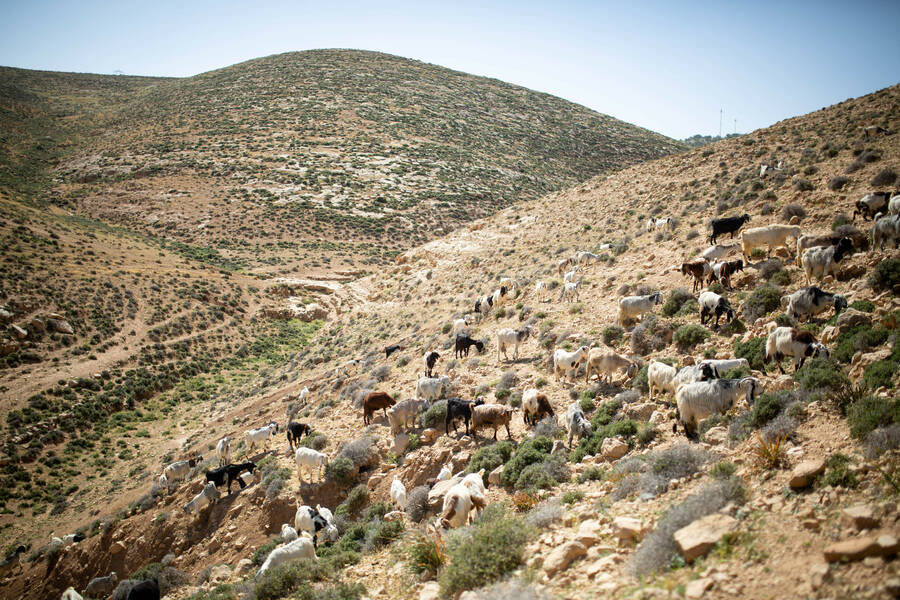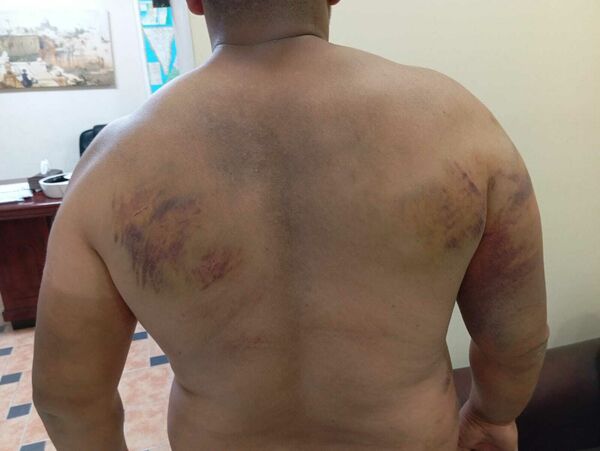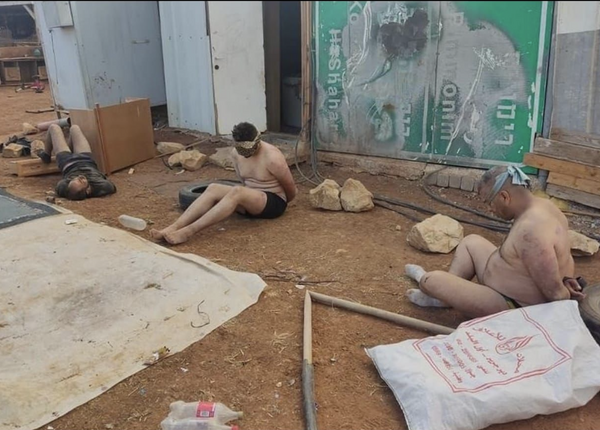“The Settlers Can Do Whatever They Want With Us”
An employee of the Palestinian Authority testifies to a brutal attack at the hands of Israeli settlers in the West Bank.

Grazing lands in the occupied West Bank in May 2023
Since Hamas’s attacks and Israel’s declaration of war on October 7th, the already-brutal settler violence against Palestinians living in the West Bank has escalated significantly. The Israeli army and police already often allowed settler violence to proceed unchecked; now, as the groups increasingly collude outright—with, for example, Israel’s far-right government explicitly arming settlers—any pretense of Israel trying to defend Palestinians from such attacks has all but vanished. “Since the war started, if you call the police or army to report a settler attack, they mostly don’t respond,” a resident of the South Hebron Hills explained to Jewish Currents last week. “We used to film [settler violence]; now, if they see you doing that, they will shoot you. The settlers and soldiers shoot at people on the highway and injure people in the villages. No one is safe.”
In the past two-and-a-half weeks, eight entire Palestinian communities have been forced to abandon their homes, as settlers and the army attack residents and scramble to grab the land. One such community is the Bedouin village of Wadi al-Siq. In February, the settler activist Neriya Ben Pazi founded a nearby outpost—part of a network of outposts he has been building since 2019, which has provided the infrastructure for expelling Palestinian shepherds from hundreds of acres of land. In an attempt to stave off this fate in Wadi al-Siq—and to protect its residents—Mohammad Matar, known as Abu Hassan, an employee of the Palestinian Authority’s Ramallah-based Commission to Resist the Wall and Settlements, has been coordinating Israeli and Palestinian volunteers to support the community. On October 12th, following an attack on the village the previous evening, settlers rounded up Abu Hassan along with two other Palestinians, beating them for hours and subjecting them to abuse that Abu Hassan compared to American soldiers’ torture of detainees at Abu Ghraib prison, as described in an article published in Haaretz. Below is an affidavit Abu Hassan gave to the Palestinian human rights organization Al-Haq. Encountering Abu Hassan at length in his own words testifies to the collaborations between the army, civil administrators, and settlers in exacting violence on Palestinian residents and solidarity volunteers, and makes vivid the bewildering terror of facing settlers wearing army uniforms to conduct their attacks. This affidavit has been edited for length and clarity.
I am a married father of five children between two and twelve years of age, and I work at the Commission to Resist the Wall and Settlements. Along with Israeli and international solidarity activists, I was present in the Bedouin community of Wadi al-Siq to protect against settlers from a nearby outpost called Neriya Ben Pazi’s Farm, who have repeatedly attacked residents of the community, their property, and their sheep. We were there because the settlers had posted on their Facebook page that on Wednesday, October 11th, they would “liberate the Wadi al-Siq area from the Palestinians.”
At dawn on Thursday, the 12th, armed settlers stormed the gathering under cover of darkness and entered the houses of the community, terrorizing the residents for more than three hours. After the settlers left, we discovered that they had stolen a solar energy system and eight solar batteries, in addition to a bag containing personal documents, photos, and a gold bracelet. In the morning, all 28 families of Wadi al-Siq—about 200 people—abandoned their tents and barracks, for fear of more settler attacks. They took with them their furniture, documents, and sheep, which they distributed among relatives in several Bedouin communities. We stayed with Israeli solidarity volunteers to make sure people were able to leave.
The settlers were present at the entrance to the community, which branches off from Allon Road, and they beat the residents as they fled. The Israeli solidarity activists left to document these attacks. Two hours later, once most of the residents had left, we hadn’t heard from the Israeli solidarity activists, and we decided to return to Ramallah. But when we arrived at the entrance to the village, we saw three cars. The Israeli solidarity activists were in the car closest to us; they were shouting at us to escape and trying to hinder the progress of the two cars behind them, which turned out to be settlers advancing toward us to attack.
I reversed the car and headed back to the village where there were still some women and children collecting their belongings. The settlers followed: Ten to twelve of them got out of two cars, some of whom were riding in the open trunks. They were armed with M16 rifles, some of them were masked and some had machetes. They were in army uniforms, but I am sure that they are settlers because they came in the settlers’ cars and some of them are known to us as people from settlement outposts in the area.
The settlers pointed their guns at us and ordered me and my colleague to lie down on our faces. They began kicking us. They kicked me hard at least ten times on my waist and head, and shouted in Arabic, “Take everything out of your pockets.” I had about 2,000 shekels and my colleague had 600 shekels. They took the money and said, “We will kill you. We will not leave any Arabs here and we will deport the rest of the Arabs to Jordan.”
A masked settler told me to unlock my mobile phone. I refused, and he hit my arms and my shoulders with the barrel of his gun. I told him to give me back the phone, which unlocks when it recognizes my iris; but because of the dust and sweat on my face, the phone would not open. So the settler struck me with the butt of his rifle on my head, and blood flowed into my eyes and over my face. I unlocked the phone using a password, and the settler took the phone and walked away while I lay on my face on the ground, as the rest of the settlers took turns occasionally beating me and my colleague. Whenever I raised my head to try to wipe the blood from my face, the settlers stepped on my head and covered my face with dirt.
I heard a settler scream in Hebrew, “He has a knife.” I was afraid that the settlers would kill me and claim I was trying to carry out a stabbing attack. I responded in Hebrew: “All I have is a vegetable knife and kitchen items,” as we had collected the belongings in our tent—chairs, sleeping bags, kitchen equipment, and cooking gas—so that we could leave with the community. These items were in a closed box in a bag in the trunk of the car I was driving. Still, he told me, “No, this is a knife you want to stab us with,” and started beating me and my colleague all over our bodies with a large stick.

Abu Hassan’s back after he was beaten by Israeli settlers for hours
Two cars belonging to the Israeli Civil Administration and a car of a settlement guard arrived, and a few people in Israeli occupation army uniforms got out. The settlers stopped beating us. One of the Civil Administration officers said “Where is your identity card?” I told him the settlers had taken it, along with our money and mobile phones. The settlers told him that we had a knife. I asked the officer, “Are these [men who beat us] soldiers or settlers?” and he told me they are soldiers, although I am sure they are settlers. In front of the Civil Administration officers, the settlers tied my hands and my colleague’s hands behind our backs—we were still lying on the ground—and I heard them say, “They are wanted by the Israeli intelligence (Shin Bet).” We knew when we heard this that it meant the settlers can do whatever they want with us. Then they beat us again, hitting us with sticks and kicking us for about two and a half hours. (I know because I saw on my watch that it was 12:30 pm when they stopped.)
A little later, army jeeps and more cars arrived—I do not know how many—and a person in a soldier’s uniform approached me. He kicked me on my left flank and then climbed on my head with both feet and rubbed my face with dirt and kicked my right ear. Then he pulled the back of my shirt and told me to sit up, so I did, and he said in Hebrew, “Do you remember me?” I told him no and he said, “I am [stationed in] Biddya, you stayed there a while ago.” I told him that I only work in Ramallah, and he kicked me on the chest and then drew a knife and tore off all my clothes except my underwear. He did the same to my colleague. Then he took off our shoes, and blindfolded us with pieces of our torn clothing.
We were taken to an empty barn nearby and forced to lie down on our stomachs with our hands tied behind our backs, our blindfolded faces pressed to the floor, where there was hay and the remains of sheep food. A settler put his foot on my head and rubbed my face into the floor. I was in a state of panic. I began to feel chest pain. I told him in Hebrew, “I have heart problems and I had a heart operation previously,” so he lifted me up and asked me where. I pointed to the side of my heart and he kicked me there. He told me to die, then he pushed my face back to the ground and started jumping on my back. I felt then that my spine would break, and that the goal of these blows was to make me permanently disabled. He started kicking me near my kidneys, and he said, “We will kill you all, and we will send you to Jordan.” Then he left.
Another young man was brought in. I heard the settlers say that he was a Bedouin. Five minutes later, I felt someone pour cold water on me. Then the beatings started again. I could hear my colleague and the third person crying out in pain, but I think the focus of the beating was on me. The settlers beat us with sticks for about an hour. They shouted, “What were you doing here?” We told them, “We were helping people to leave.” The settlers shouted that we are saboteurs. We replied that we are not saboteurs, we were helping people, we are against the war, we are with the Palestinian Authority. The settlers responded: “You are all garbage Arabs, you must go to Gaza and die.” They continued to beat us for about an hour. When they paused for a few minutes, a settler urinated on my head and body.

Abu Hassan with two fellow Palestinian detainees, cuffed and blindfolded, Wadi al-Siq, October 12th, 2023.
I was screaming from the intensity of the pain in my hands. It was as if the blood had stopped flowing to them and they were swollen and about to be severed. A settler came and untied the ropes on my hands, and I thought he was relieving me, but instead he tied my hands behind my back with a braided metal wire. I felt even more pain, and he beat me with a stick for ten minutes, then he put the stick to my anus and, without taking off my underpants, began to press. I pressed back, trying to prevent the stick from entering. He kicked me on my back to try to make my body relax, but I refused, and with great effort I moved so I was further from the stick, and then he beat me until I collapsed and, crying, said: “Put a bullet in my head so we can end this matter.” I stayed collapsed on the ground for half an hour, listening to the sounds of my colleague and the Bedouin man shouting.
At seven o’clock in the evening, I heard someone enter the shack. I thought it was a settler who wanted to start another round of beatings, but the person freed my hands from the chains, lifted the blindfold from my eyes, and brought me water, and he did the same with my colleague and the Bedouin man. I saw that he was wearing an army uniform, and from the way he examined us, I think he was a military doctor. We were taken outside by officers from the Israeli military liaison, including one who had come at the beginning and left us to the settlers. A military ambulance came and took us to the Shaare Tzedek Hospital in Jerusalem, and we told [an officer] that we were afraid of the settlers coming to attack us, so he requested a military escort for us. We waited for half an hour, but it did not come. Meanwhile, our colleagues at the Commission [to Resist the Wall and Settlements] had heard the news of our detention through people in the community, and they sent a Palestinian ambulance that took us to the hospital in Ramallah, where we were admitted to the emergency room. There were bruises all over our bodies and we had significant increases in muscle enzymes, in addition to damage to the kidneys and liver. They gave us painkillers, and medicine, and closed the wound in my head with four metal staples. I stayed in the hospital for half a day, my colleague stayed for three days, and the Bedouin man for four. Still, when I stood up, I would lose my balance, so I went to an ear, nose, and throat doctor, who found that my right eardrum had been punctured as a result of the beating. I have filed a complaint with the Palestinian police, and I intend to file a complaint with the occupation police.
Mohammad Matar is an employee of the Palestinian Authority’s Commission to Resist the Wall and Settlements.
Al-Haq is a Palestinian human rights organization based in Ramallah.